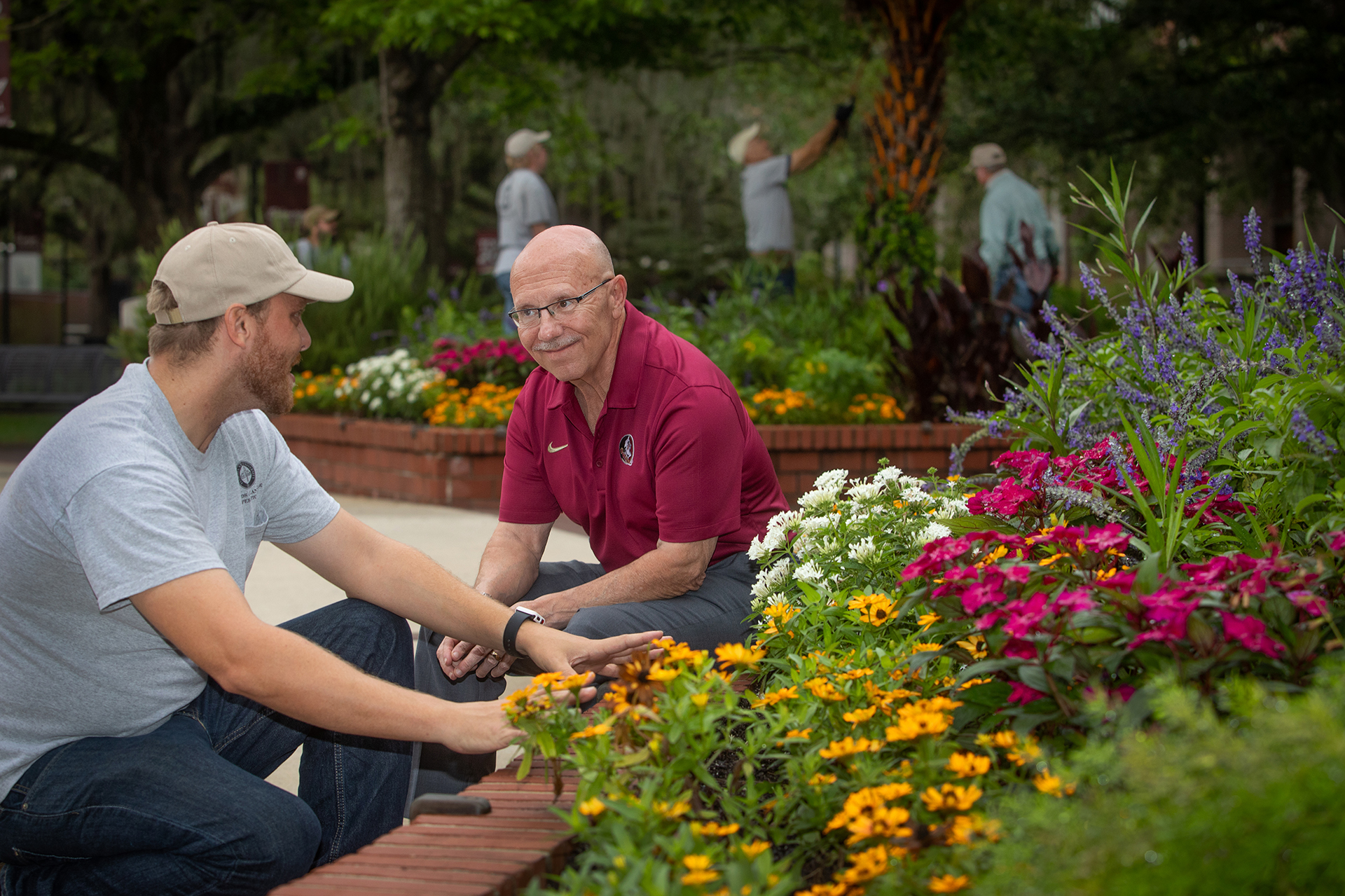As International APPA stretches its systems, techniques, and programming in new ways following a major governance restructuring, Dave Irvin, associate vice president for facilities at Florida State University (FSU), is the first APPA volunteer leader to serve as Chair of the Board of Directors under the association’s visionary strategic framework, Preparing for Every Future (see sidebar).
An Unexpected Path
Irvin’s path to facilities management and APPA was a little different from that followed by many of his colleagues. “Facilities management is not what you usually would say when asked what you want to do with your life,” he says. “I was in private (architecture) practice when I was first out of school, but I realized I would be a better designer if I knew more about how people use buildings. A friend recommended me for a job at Emporia State University, and I found what I wanted to do with my professional life.”
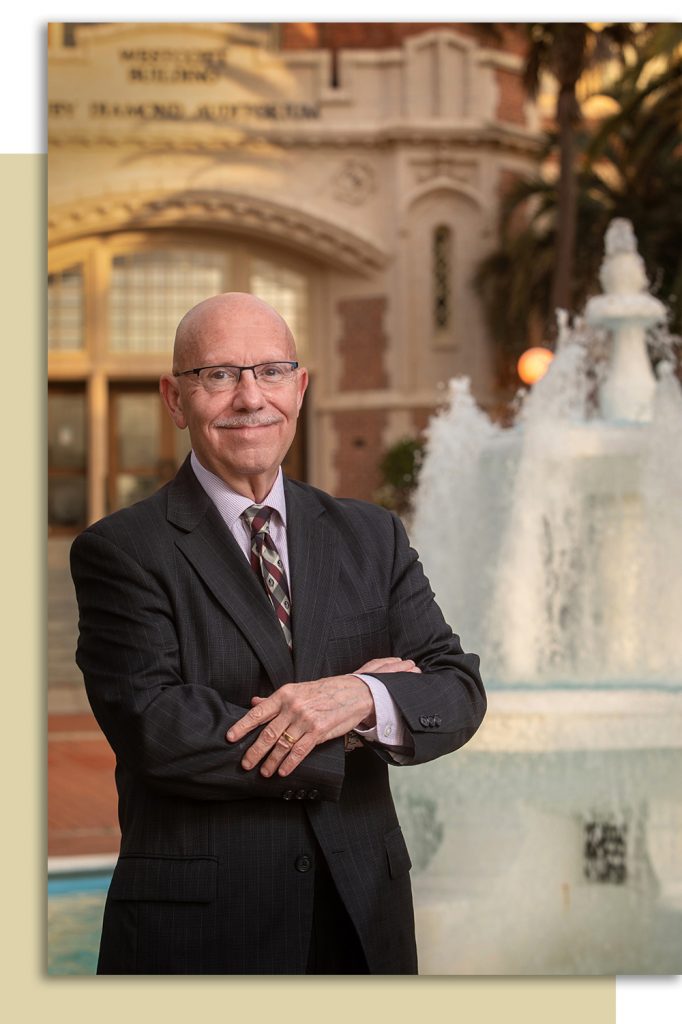
APPA Board Chair Dave Irvin in front of the fountain outside Westcott Hall, Florida State University’s administration building and Grand Gateway to FSU.
That serendipitous change in direction has clearly been a success. Irvin had earned a bachelor of science degree in architectural studies with high distinction from the University of Nebraska Lincoln (UNL). He then did graduate work in architecture, planning, and design at Oxford University in England, and went back to UNL for master’s work in architecture, construction engineering, and planning. His first job in facilities was as university architect at Emporia State University in Kansas, which led to the assistant physical plant director position. That was followed by employment as associate vice chancellor/director, facilities maintenance and planning at the University of Nebraska Omaha; associate vice president for plant operations at the University of Houston main campus and associate vice chancellor for plant operations for the University of Houston System; associate vice chancellor for facilities services at the University of Tennessee Knoxville (UT Knoxville); and his present position at Florida State.
At FSU, Irvin leads a facilities team of more than 900, who work on four campuses and in more than 300 buildings covering 20 million sq. ft. and 1,200 acres. He oversees master planning, design, construction, renovation and capital projects, in-house design, maintenance operations, janitorial, landscape services, and utilities/infrastructure. His responsibilities also cover sustainability, recycling, energy conservation, historic preservation, and more. Irvin’s team also includes all university fire, life safety, and code officials.
All of those responsibilities involve an annual operating budget of $80 million, $1 billion in capital expenses, and $100 million in renovation and renewal.
Irvin also serves as the university and facilities representative on city commissions and the university real estate board, the FSU Research Foundation, and the FSU Athletic Foundation.
Among his achievements have been merging facilities teams in housing, union, and other student affairs groups into one large, comprehensive “blended team” that resulted in savings in time and finances; better service to the entire university; and increased training, support, and career opportunities for everyone in the Facilities Group. He has also managed a major reorganization to completely revise the facilities accounting system, including budgeting and procurement.
In part thanks to APPA resources, Irvin has also developed benchmarks that incorporate data analysis to target and use resources more efficiently and incorporate leading-edge practices in a variety of facilities areas.
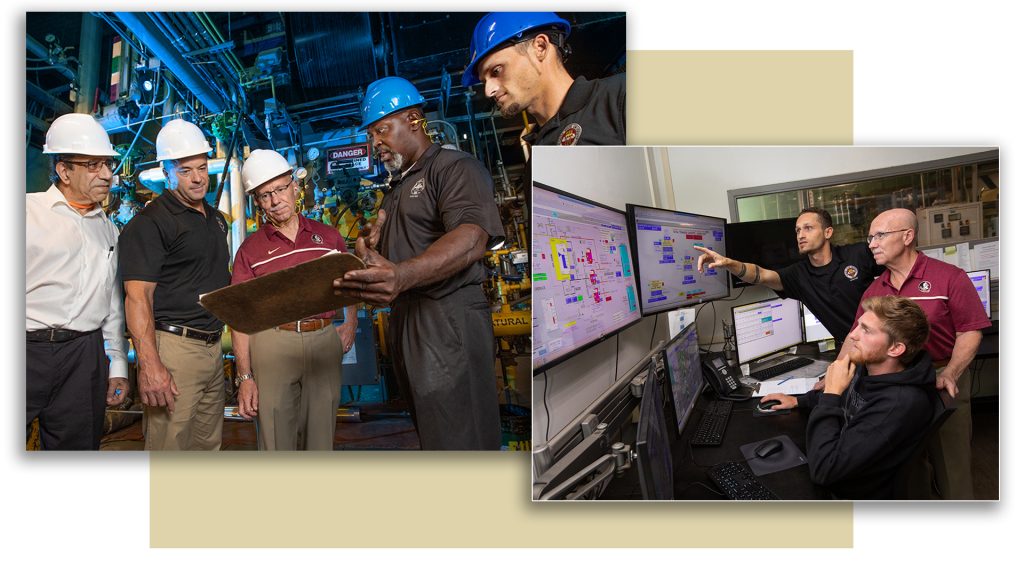
Left: Irvin meets with FSU Utilities employees. Right: Meeting with Central Utilities Plant employees.
“I wasn’t looking for a new job,” he says of his move from Tennessee to Florida in mid-2020. “I had a great team; in fact, every place I’ve been, I’ve had excellent people. I really like looking at resources and how we can become more engaged in our mission. Florida State came to me with an offer I couldn’t refuse—they had plans in mind to make progress, and I could see ways for facilities management to fully engage, such as thinking about what a campus will need to come back from the pandemic, and putting together a Healthy Campus effort and a team that can respond in real time.”
Especially important to Irvin was FSU’s commitment to professional development for its facilities management staff.
All in all, Irvin says, this unexpected career—both on campus and in APPA—has been and continues to be “incredibly rewarding.”
The APPA Connection
Irvin joined APPA while at Emporia State and has been grateful ever since. “When I started there, I didn’t know about APPA,” he recalls. “My boss was a member, and we sponsored a CAPPA [Central Region of APPA] regional conference on our campus. I had the opportunity to see all the aspects of APPA programming and resources, and I joined. APPA has always been there to support what I do. I can’t imagine I would have progressed as I have without APPA to back me up.”
Irvin has been active in APPA since he joined. These days, the Florida chapter president is on his team, so he didn’t have to do a “big sales job” to incorporate APPA resources into his programs. “We are making sure staff have opportunities through APPA for training and access to tools,” he says. At both UT Knoxville and FSU, Irvin garnered support for continued personal and professional development of facilities staff by registering several dozen staffers at the Virtual Facilities Summit (APPA’s annual conference) and Facilities Symposium throughout the pandemic—more people than any one school has sent at one time. While many, if not most, schools clamped down on travel and training expenditures, Irvin ensured that his institutions continued their commitments to professional development as a valuable tool and resource.
Professional development has been the biggest benefit of APPA membership for Irvin. “No other organization has the breadth or depth of our classes and tools,” he says. “No one else has the incredible network of APPA. No matter what the issue might be, APPA has colleagues all over North America who have the answers—you don’t have to reinvent the wheel.”
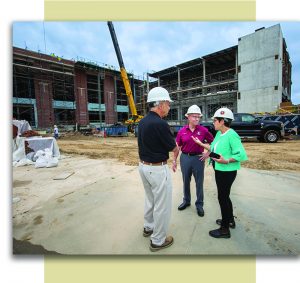
Irvin receives construction update from project team for the new student union.
That network offers more than answers and advice, Irvin adds: “APPA is a tremendous source of mentoring. There’s always someone you can bounce ideas and issues off of.”
While some aspects of support for professional development were an easy win, Irvin made a conscious effort to convince leadership at his various institutions to support his commitment to professional development for his facilities staff through APPA. “I’ve taken a multipronged approach,” he says. “Universities are all about continued, lifelong learning, and that has resonance when you talk about training and development, but that won’t get you there. You have to figure out what facilities management can do and contribute, what campus leadership will see as a result of professional development. Then you put together a business plan that shows return on investment for your chief financial officer. That’s a language that your CFO and your president understand. Couple that philosophical approach with the investment angle.”
To make the most of these impressive resources, Irvin urges anyone new to educational facilities management—and to APPA in particular—to “jump into the pool with all the gusto you have, because you only get what you put into your membership. Go full steam ahead.” That’s exactly what he did early in his APPA career. “Use APPA from 360 degrees. Look for colleagues with similar issues. If you want to lead, APPA will give you the tools you need. That goes for both on-campus and within the association.”
Irvin also values the way that APPA evolves and adapts over the years to what its members—both institutions and individuals—need. “The fact that APPA has a new visionary strategic framework is exactly why I ran for President-Elect in 2020,” he says. “Lots of people in the association have more experience, but we are at a unique point to envision what APPA and facilities management will be like post-COVID. That really animated me. We were already looking at strategic change and reorganization; COVID showed us why we have to change. We have an unbelievable opportunity because facilities are so critical.”
In fact, “the way APPA responded to COVID, which went virtual, increased participation,” he notes. “That told our team that they were crucial and mattered, and now we have a whole bunch of folks who are really excited about their careers and APPA. We have new tools so we can spread the APPA message even farther.”
The pandemic has put the spotlight on facilities teams at educational institutions, according to Irvin. “We’ve been given a seat at the table. Our leaders have an opportunity to be seen as a pillar of success,” he said.
Serving Both Public and Private Institutions
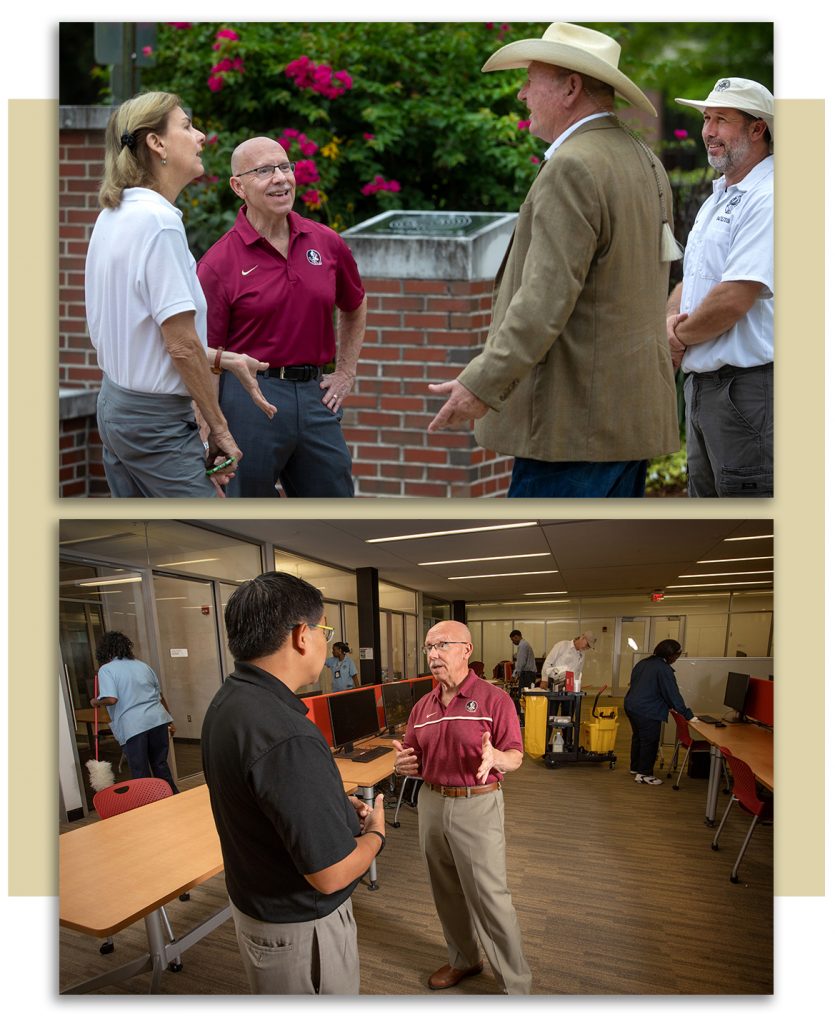
Irvin meets with FSU’s Landscaping and Grounds team (top), and with Building Services employees (bottom).
Irvin’s career has been in state higher education institutions, but he sees a connection between such schools and private ones, and expects to serve both in his role as APPA’s first Board Chair. “There are some differences, but public institutions are increasingly looking for private funding sources,” he says. “The tools are different, but there are APPA people in all elements of education—it isn’t me alone. I can share my experiences and make sure colleagues in all types of institutions are able to connect and use APPA resources to get things done.”
The FSU campus is “coming back to full life—our residence halls are at 110% capacity, and we have record enrollment for the fall,” he says, and that creates its own demands, of course. “The question of deferred renewal has yielded to a new question: How can facilities management support the university, retain our seat at the table, and continue to be viewed as one of the leaders of the institution?”
As institutions enter a new era, Irvin encourages colleagues to make the most of APPA resources to manage the health and safety aspects of their institutions.
Valuing Staff and Colleagues
Irvin brings a commitment to both professional development and teamwork to his new role as APPA’s chief volunteer leader. He is someone who recognizes the value of his staff and colleagues—and of leading APPA’s new governance transition. “As an individual, I’ve been incredibly blessed with talent everywhere I’ve worked,” he says. “I’m the one-star athlete who’s surrounded by the five-stars who can bring it all together. Whether you’re thinking of your campus or your APPA membership, avail yourself of the talent around you and you’ll succeed.” Irvin is a great example of his own philosophy.
Ruth Thaler-Carter is based in St. Louis, MO, and has been contributing to APPA publications since 1988, from magazine features to monographs to conferences and electronic newsletters. She can be reached at [email protected].
